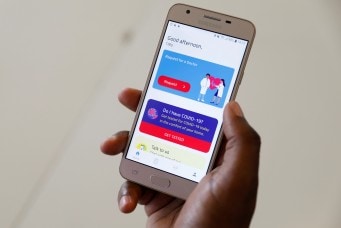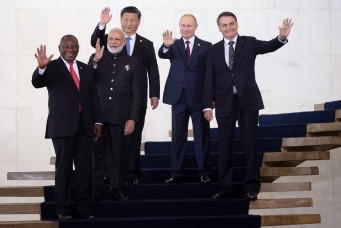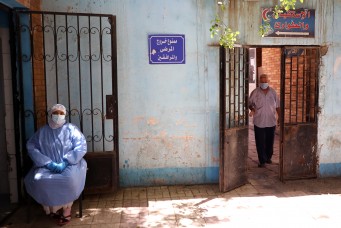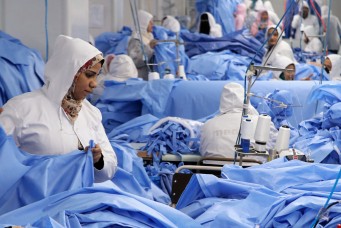Stopping the Spread: A Citizen’s Engagement
Africa is no stranger to recent outbreaks and therefore has a foundation to combat the coronavirus, but more must be done to ensure the informal economy is included in a comprehensive strategy to beat COVID-19.

Kenyan fashion designer Ruth Martin wears a protective face mask, as a measure to stem the growing spread of the coronavirus disease (COVID-19) outbreak, as she poses for a photograph inside her studio in downtown Nairobi, Kenya April 9, 2020. REUTERS/Njeri Mwangi
The COVID-19 storm will eventually pass. But, if any early lessons are to be learnt from the pandemic, it is that African citizens with disposable resources such as income, time, and knowledge must work with their governments to reset the relationships with the most vulnerable in their communities and together combat the virus’ spread and any future diseases.
The social and economic effects of the COVID-19 pandemic will be far-reaching. Thus, the consequences of the current measures to stop the spread and to flatten the curve are to limit the pressure on Africa’s healthcare system in rural and urban areas. These measures will have disproportionate effects on our society. Physical distancing puts pressure on the socioeconomic arrangements of markets and informal traders. It thus potentially puts able citizens between the virus and hunger. African governments and citizens have been sensitive to these specificities. In Togo, the government—through novissi, meaning “solidarity” in local dialect—enabled digital cash transfers as a safety net mechanism. Food distribution in Uganda and Ghana, for example, is designed to limit exposure to the virus by replacing women’s commute to the market.
This pandemic is redefining local economies, but it also gives us an opportunity to rethink a community’s journey to access services. The journey from informal to formal economies need not be just about transforming the market into a mall. Physical distancing and lockdown measures demonstrate that food supplies and affordability are vital to stop the spread of the virus. With Africa’s $65 billion food import and 60 percent of the African population engaged in agriculture, redirecting these resources for internal production and safe distribution channels will provide an internal mechanism to strengthen the delayed African Continental Free Trade Area.
As the number of COVID-19 cases continues to rise in Africa, at stake is how we care for the most vulnerable; they represent the strongest links between the African economies. Though they do not have a social safety net, they work to ensure that offices, malls and markets are clean. They trade goods and services indispensable for the commute of civil servants and other office-bearers stuck in their private or public means of transportation. Furthermore, informal markets maintain a food supply value chain between rural and urban areas.
Thus, when Africa beats the virus, it must ensure the intactness of a newly established foundation which considers thinking about vulnerable communities an essential approach to economic transformation.
Social distancing—maintaining physical distance between people to prevent the spread of disease—can happen at some scale, but Africa’s fight must be won through prevention. It is a required measure facing several factors limiting its implementation, such as constrained access to clean water, inability to earn a living while staying at home, or lack of liquidity to stock up on food and other supplies.
Three areas require our attention to ensure that structural reforms strengthen what we have while preventing a COVID-19 catastrophe in 2020. It is possible to hold the spread of COVID-19 at bay when all Africans in Africa and abroad do what is in their power to adhere to policies designed to slow the spread of the virus and limit the need to test the mantle of our healthcare systems.
The market woman, urban slums, and the pandemic response
Every dawn, women throughout the continent prepare to trade in commodities that will fill homes across cities and villages. African women represent the cornerstone of the socioeconomic organizations within our communities as they play a vital role in connecting farmers across the countries with buyers.
But the work they do is challenged, at times, by our inability to support informal traders along higher value chains. Relatedly, and also a constant feature of our environments, are urban slums, which house people who provide their skills to businesses across many African cities and who, under current circumstances, struggle to have a decent home, access to running water, and basic sanitation.
The lack of access to adequate electricity and the Internet—often luxuries which in times of restrictive measures affect their daily trade—will put pressure on individuals’ abilities to sustain their livelihoods.
With the current response to the pandemic focusing on physical restriction, millions of Africans will not have access to their daily opportunities to secure resources for themselves and their families. In some countries, the informal economy accounts for up to 90 percent of jobs, yet workers—from market women to street hawkers—remain the most vulnerable to shocks, as they lack any form of state-supported social protection.
As a result, COVID-19’s tendency to spread through social interaction removes a pillar of the informal worker’s business model.
But, this doesn’t have to be the case.
Here, we have an opportunity to redesign our policies to provide a framework for nonsalaried workers.
It will be a game changer when we address how communities with disposable resources come together now and for the foreseeable future to create and maintain value chains for the informal sector.
Informal traders such as market women can continue to trade through more hygienic sourcing and delivery mechanisms. The market as we know it needs to change its infrastructure to protect entrepreneurs. We all benefit from the goods and services offered by the informal economy. We know that open markets with live animals such as guinea fowls, chickens, grass cutters, and others are commonplace in most of our cities. These markets will continue to flourish as demand exists. Creating better market conditions to stock and trade may provide some limitation in the animal-to-human transmission.
Furthermore, sourcing, distributing, and preserving need a collective reflection as well as the determination to apply policies and regulations already in place. The market needs to be modernized without being transformed into a shopping mall. In most cases, informal sector entrepreneurs do not seek charity, but opportunities to sustain their communities’ livelihoods in normal times as well as during endogenous and exogenous shocks.
A Tomorrow Better Prepared
The window of opportunity is closing not only for containing the virus, but also for us to pause and act so that tomorrow finds us farther away from pandemics or better prepared to face them—not if, but when, they occur. The measures imposed might not be sufficient to adequately curb the spread of the virus as testing capacity is still limited on the continent. When that window closes, our specificities that have allowed us to limp forward within the informal sector will not stand the test of the virus. While we recognize the urgency to act, we anticipate that action has to be balanced with the urgency to devise policies that put the majority of Africans at the center of the policymaking and delivery mechanism.
All countries have to act fast and find solutions that protect human life from the virus. While life in African markets and urban slums does not necessarily allow for stockpiling essential goods, let alone working remotely, we should remember that measures to keep people apart (social distancing) worked in the fight against Ebola in West Africa and recently in the Democratic Republic of Congo (DRC). We had a warning sign six years ago, but did not accelerate the pace of the required reforms to ensure that better employment limits people’s interactions with African health systems as they have the means to invest in their mental and physical health.
The recent Ebola outbreak in the DRC and the 2014 outbreak in West Africa gave urban dwellers a false sense of immunity to deadly viruses. Now, we are all at risk regardless of our position in society, and COVID-19 further exposes the existing vulnerabilities in our urban areas, which are hit hardest based on existing data.
The current strategy of social distancing supposes that health systems have to be used for those that need them the most. A string of usual suspects, from malaria to Lassa fever and HIV, have made the existing structures congested and inadequate even when the curve is flattened. Therefore, an overhaul of health systems is the silver lining at the end of the pandemic. Without health reform, the policies that will follow will be built on the same crumbling foundations that we have been accustomed to.
Our governance model should allow us to determine what kind of work future generations will inherit. COVID-19 confines communities in areas that were already inadequate. The issue of slum-dwellers provides us with a framework for an overhaul of urban planning, without which strategies to contain pandemics—such as COVID-19, which require social distancing, lockdowns and other measures that restrict the opportunity to earn daily subsistence—may fail.
In South Africa, 2.5 million people earn their income from the informal sector, and each African country has its own fair share of contributors to the informal sector. We need a system that prevents all Africans from preventable diseases. This on its own, without improving living and working conditions for the majority, is impossible.
Building a cashless Africa infrastructure
Most countries today have built an infrastructure through mobile applications and Unstructured Supplementary Service Data (USSD) codes, which do not require data for transactions to happen. According to the Groupe Speciale Mobile (GSMA), which represents global mobile operators, 17.5 million new active accounts were created in 2018 and in thirteen African countries and over a third of adults are active mobile money users. However, the existing infrastructure does not go beyond the first mile of giving access to simple transactions and serving as a loan and savings platform. Well-intentioned policies such as “cashless Africa” lack the infrastructure to make most citizens embrace the transition to fully digitized services; some services delivered by the market women remain cash transactions. Yet, we know that bank notes are a contributing factor to the spread of the virus, so a push for the transition to a cashless society needs to be accelerated. In that push, the model needs to put the majority—women—at the center of the design. In times of crises or sudden shocks, the infrastructure to deliver goods and services to urban slums and other communities needs to be built as the first mile, essentially to start with the majority in mind.
The transition to a cashless society needs to carry along those who could be the most vulnerable during a pandemic, and by this we mean using the technology to offer an incentive to increase the willingness to pay for healthcare.
An insurance scheme designed for the most vulnerable while ensuring quality access to healthcare is a requisite step on the back of the existing infrastructure. It provides a pathway for informal workers to be treated when needed and cover their loss of income. In other words, digital financial services used to record transactions and determine the loan amount can also be used to provide a source of income when the informal trade is stopped due to circumstances beyond our control. What we need is a system that adapts to the needs of the less fortunate in the community, because they are our strongest link in the communities. Making sure that basic health services are made available to all provides us with a surveillance mechanism which helps identify existing health issues such as Ebola, Lassa fever, and other viruses that erode daily progress made by women and others striving for progress.
But the real innovation lies in the role that the African digital economies’ leaders must play to move the health agenda from a disease conversation to a data narrative. That narrative helped Asian countries leap forward in their strategic response to the coronavirus. Health is no longer in the ambit of ministries of health only. Speed and accuracy as well as access to accurate data are keys to reversing the speed at which COVID-19 runs. China and South Korea proved that technology could play a significant role. Google provides citizens and governments with data on our movements for effective decision making on health response. African economies are becoming digital by their citizens’ adoption of mobile technologies; digital economies in Africa must consider health an integral part of their strategy.
Harnessing the existing infrastructure for greater resilience
COVID-19 exposed the limits of a system built on a unique center of production for the world. In African economies, the process of industrialization is a sure pathway to lift millions of Africans out of their daily subsistence mode to jobs along the value chains of our agricultural resources. It means that the informal infrastructure cannot just be done away with, but complemented by new jobs in sectors where demand will come from the African continental Free Trade Area. The market woman has a role to play in this model too, as she is part of the value chain.
In almost every African city, there are weekly, if not daily, collections of taxes from workers in the informal sector. What we propose here is to use the already-existing infrastructure to record businesses in the informal sector, bringing them into the formal economy. What this could provide is an opportunity to give them social protection, which may be different from those formerly employed in other sectors. Such a scheme must be gender-sensitive in order to be effective. Women make up 74 percent of the informal sector in African countries, and the majority of them lack access to social protection and remain highly vulnerable to shocks. Once they retire, they must rely on family support—it is going to be a learning process for African countries.
The African continent has the fastest urban growth in the world; this presents new challenges that could further exacerbate the continent’s ability to respond to crises in an effective manner.
As the world, eventually, limps out of the pandemic, the big humanitarian and financial squeeze requires implementation of a global solidarity mechanism. Drawing from women-led traditional mechanisms where each contributes to a common pot, we can ensure that resources are pooled and managed not just for emergencies. This pandemic must make us move from crisis management to planning and execution. And for this, we need resources: either through an insurance scheme like the one currently being developed by African Risk Capacity in the wake of the Ebola outbreak in West Africa or a global solidarity fund. Digital financial services mean that everyone can contribute according to their means. Solidarity is the strongest pillar during this pandemic—the ability to stand together regardless of race, gender, or religion. The COVID-19 coronavirus itself does not distinguish humanity along those lines.
Global solidarity funds, which arose in the wake of the response to COVID-19 by the World Health Organization, and locally in South Africa and Senegal to support their countries, need to move beyond national interests for a pan-African response. These funds need to become a permanent feature of continental efforts to prepare Africa for shocks while continuously strengthening the foundation. It is the way we redesign our infrastructure for the majority that will determine our life in Africa as well as our positioning in the world post COVID-19. Ebola was a wake-up call, COVID-19 is a pandemic that came to remind us that prevention is the best cure.
COVID-19 is a scar on the memory of all current generations. The measures to limit its spread are privileges that many cannot afford. Yet, if we agree that we are in this together at the end of it, we cannot act as if this pandemic was devoid of consequences for the majority of Africans in the informal sector.
Tomorrow must find us farther away from viruses, because prevention and surveillance will become routine at all levels of society. African governments are responding and so must the minority of privileged citizens so that when the next virus spreads, we can safely implement measures that make us speak of inequities and inequalities as conditions that ended with the 2019 coronavirus.
Carl Manlan works at the intersection of public, private, and civil society sectors at Ecobank Foundation in Lomé, Togo. He is a graduate of Harvard Kennedy School and the author of numerous articles on African economic transformation. On Twitter: @CarlManlan.
Read MoreSubscribe to Our Newsletter





